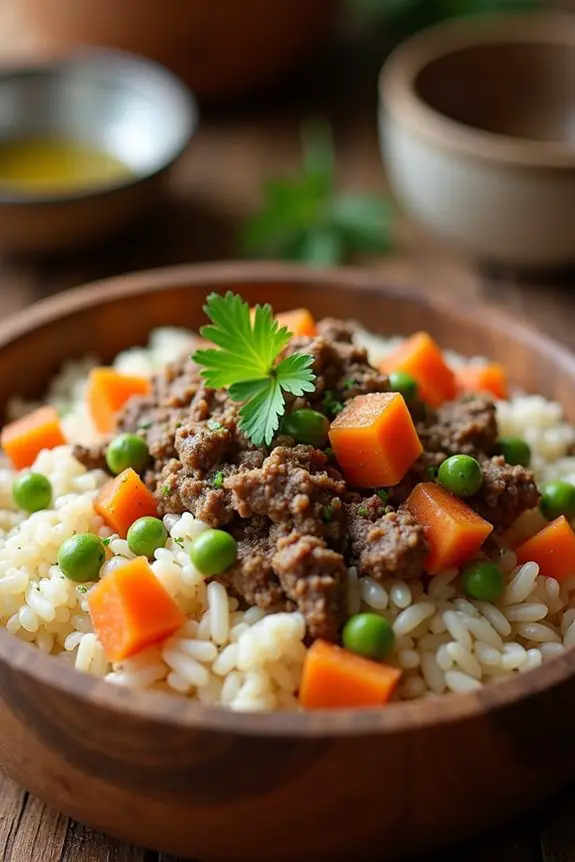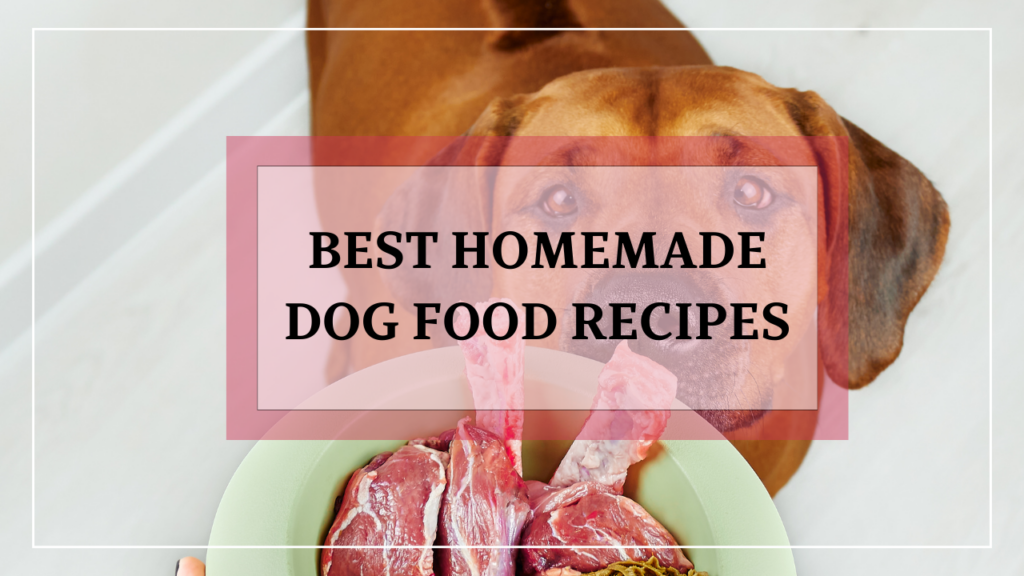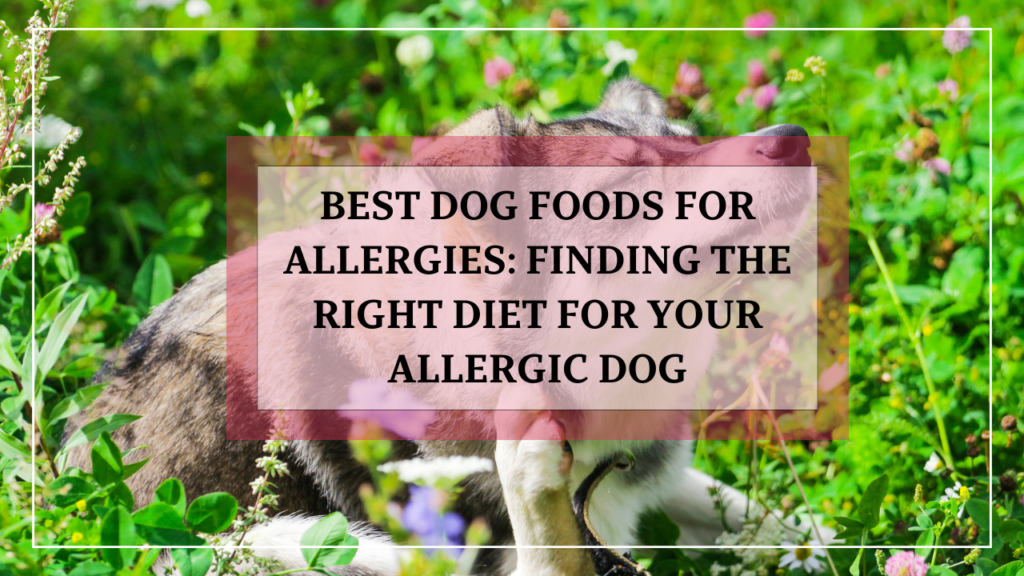If your pup’s been scratching more than usual, it might be time to rethink their food. You wouldn’t want to eat mystery meat every day, right? The good news is, homemade meals can be a game changer. Think salmon, sweet potatoes, maybe a sprinkle of veggies—sounds fun, doesn’t it? If you stick around, I’ll share some tasty recipe ideas that’ll have your furry friend wagging their tail in no time.
Why Homemade?
When it comes to your furry friend and their pesky skin allergies, you might wonder, “Why should I bother making homemade dog food?”
Well, let me tell you: it’s like giving your pup a gourmet meal without the hidden ingredients that could be making them itchy or uncomfortable. Store-bought options often have fillers or allergens, which isn’t what you want for the best dog food for skin allergies.
By whipping up some homemade dishes, you can control exactly what goes into their bowl—think lean meats and wholesome veggies. Plus, it’s kind of a fun bonding experience.
Who wouldn’t want to cook for their best buddy? Sure, your kitchen might look like a tornado hit after you’re done, but the happiness on your dog’s face is priceless.
Homemade Meal Ideas
If you’re looking to whip up some delicious homemade meals for your pup with skin allergies, you’ve got some tasty options.
Think about a salmon and sweet potato dish, or a chicken and quinoa medley that’ll make their tail wag.
Cooking for your dog can be simpler than you’d think, and trust me, your furry friend will appreciate the effort, even if you accidentally mix up the salt and sugar once in a while.
1. Salmon and Sweet Potato Dish

Let’s whip up a tasty Salmon and Sweet Potato dish that your pup will love. You’ll need some simple ingredients, and I promise—it’s easier than it sounds. Plus, we’ll cover step-by-step instructions and a few optional add-ons to make it even better, because why not spoil them a little? Cooking your dog’s meals at home can also be a great way to ensure their diet is perfectly balanced and tailored to their needs. For a delectable treat, consider adding some freeze-dried salmon treats to enhance the flavor and provide nutritional benefits for your dog.
Ingredients
Are you ready to whip up a delicious dish for your furry friend? This Salmon and Sweet Potato recipe isn’t only tasty but also packed with nutrients! Plus, it’s super easy to gather the ingredients. Let’s dive right into what you’ll need for this wholesome meal.
- 1 cup of fresh salmon fillet (boneless and skinless)
- 1 medium sweet potato (about 200 grams), peeled and diced
- 1 cup of green peas (fresh or frozen, no need to thaw)
- 1 tablespoon of olive oil (for a little extra flavor, and healthy fats)
- 1/4 cup of chopped parsley (great for digestion and fresh breath)
Now, I’ve to confess, cooking for your pup can be a bit like preparing a dinner for a selective toddler.
Who knew sweet potatoes could be so popular with dogs?
And don’t even get me started on the salmon; it’s like their version of going out for sushi. It’s a true win-win!
Just picture your pup enjoying this meal like it’s a five-star restaurant dish. You might even be jealous!
Step by Step Instructions
1. Preheat your oven to 400°F (200°C) so it’s nice and toasty by the time you’re ready to bake.
2. Rinse the salmon under cool water, then pat it dry with a paper towel. (Fish can be pretty slimy, so just be careful not to drop it.)
3. Place the salmon fillet on a baking sheet lined with parchment paper for easy cleanup.
4. Drizzle a little olive oil over the salmon, and sprinkle with a pinch of salt for flavor—your dog will love it too.
5. Peel the sweet potatoes and chop them into bite-sized pieces. Remember, the smaller the pieces, the quicker they’ll cook. (Trust me, nobody wants a rock-hard sweet potato in their bowl.)
6. In a pot, bring water to a boil and add the sweet potato chunks. Cook them for about 15 minutes, or until they’re fork-tender.
7. Drain the sweet potatoes and let them cool for a moment.
8. In a bowl, mash the sweet potatoes with a fork until smooth—don’t worry about perfection; a few lumps are okay.
9. While the sweet potatoes are cooling, bake the salmon in the oven for about 15–20 minutes, or until it’s opaque and flakes easily with a fork.
You’ll know it’s done when it looks all yummy and juicy.
10. Once both the salmon and sweet potatoes are cooked and cooled slightly, flake the salmon into bite-sized pieces and then mix it into the sweet potatoes.
11. Combine until well-blended, ensuring there are no large chunks that might choke your pup.
12. Cool completely before serving to your dog; dermatology-approved dining should always be at a safe temperature.
Optional Add-ons
While your pup is savoring their delicious salmon and sweet potato feast, you might want to contemplate jazzing it up a bit with some optional add-ons that not only enhance flavor but also boost nutrition.
Consider tossing in some fresh spinach or a sprinkle of flaxseed for omega-3s.
Who knew meal prep could make you feel like a gourmet chef? Your dog will think so.
2. Chicken and Quinoa Medley

Ready to whip up a tasty Chicken and Quinoa Medley for your pup? It’s packed with ingredients that not only support skin health but also make mealtime super exciting. Let’s break down the steps, toss in some optional add-ons, and make your furry friend’s tail wag in delight.
Ingredients
When you’re thinking about whipping up something special for your furry friend, chicken and quinoa is a fabulous choice.
It’s not just tasty but also packed with nutrients to keep those skin allergies at bay. Plus, trust me, your pup will love this medley.
Grab your apron, and let’s gather up these simple, wholesome ingredients for a delightful homemade meal.
- 2 cups of boneless, skinless chicken breast, diced into bite-sized pieces
- 1 cup of quinoa, rinsed (you’ll want to remove that bitter coating)
- 2 cups of low-sodium chicken broth (or water if you’re feeling brave)
- 1 cup of sweet potatoes, peeled and diced (because, let’s be honest, sweet potatoes make everything better)
- 1/2 cup of green peas (frozen works just fine, no need for fancy farmers’ market trips)
- 1 tablespoon of olive oil (just a splash for some extra flavor)
And there you have it!
All these ingredients are wholesome and safe for dogs, so no sneaky surprises here. Just think about how happy your pup will be when they smell that deliciousness cooking.
It’s bound to be a hit, trust me!
Step by Step Instructions
1. Start by rinsing 1 cup of quinoa under cold water in a fine-mesh strainer. This helps remove any bitter coating on the grains.
2. In a medium saucepan, bring 2 cups of water to a boil over high heat.
3. Once the water is boiling, add the rinsed quinoa, reduce the heat to low, and cover the pot. Let it simmer for about 15 minutes or until all the water is absorbed.
(You’ll know it’s done when the quinoa looks fluffy and the little tails have popped out!)
4. Meanwhile, in a separate pot, bring another pot of water to a boil. Gently place 2 boneless, skinless chicken breasts in the boiling water.
Cook for about 15–20 minutes or until the chicken is no longer pink in the center.
5. Once the chicken is fully cooked, remove it from the pot and allow it to cool.
Then, using two forks, shred the chicken into bite-sized pieces.
6. In a large mixing bowl, combine the cooked quinoa and shredded chicken.
7. Add 1 cup of diced carrots and 1 cup of chopped green beans to the mix.
(You can use frozen veggies if that makes life easier—just thaw them first!)
8. Stir in 1 tablespoon of olive oil and a pinch of salt for flavor.
Mix everything together until well combined.
9. If you want to get fancy (and let’s be honest, who doesn’t?), you might also consider adding a sprinkle of turmeric, as it’s great for your dog’s skin health.
Just a little bit will do.
10. Serve the medley warm but, most importantly, let it cool completely before serving to your dog.
(We wouldn’t want them to burn their tongue, now would we?)
There you go! Your homemade chicken and quinoa medley is ready for your furry friend. Enjoy mealtime together.
Optional Add-ons
If you’re looking to switch things up for your pup’s meals, you’re in for a treat.
Try making a Chicken and Quinoa Medley. Just cook some chicken, mix in quinoa, and toss in veggies like peas or carrots.
It’s easy, healthy, and your dog will love it. Plus, you’ll feel like a gourmet chef, even if you can’t boil water without burning it.
3. Beef and Vegetable Cookup

If you’re looking to whip up a tasty and healthy meal for your pup, the Beef and Vegetable Cookup might just be the ticket. Imagine this: tender beef chunks paired with colorful veggies, all simmering together—your dog’s tail might just wag off! Let’s break down the ingredients and step-by-step instructions, plus throw in some optional add-ons that’ll have your furry friend begging for seconds. Remember, incorporating premium dog food supplies can elevate your dog’s diet and ensure they receive all the essential nutrients they need. Additionally, using a professional dog grooming kit can help maintain your dog’s coat, which is essential for overall health.
Ingredients
When it comes to whipping up a tasty homemade meal for your dog, nothing beats the good ol’ beef and vegetable cookup. This dish isn’t only scrumptious, but it’s also safe for those dealing with pesky skin allergies.
Plus, it’s super easy to make, even for someone who might struggle to boil water without making a mess. So, let’s explore what you’ll need for this hearty meal that will make your pup’s tail wag with joy.
- 1 pound of lean ground beef
- 1 cup of chopped carrots
- 1 cup of green beans (fresh or frozen)
- 1 cup of diced potatoes (make sure to peel them first)
- 1 tablespoon of olive oil
- 1/2 cup of peas (fresh or frozen)
- 1/4 cup of plain pumpkin purée (not the spiced pie filling)
Gather these ingredients and you’re already on the path to becoming your dog’s culinary hero.
And remember, it’s all about making wholesome choices, so stick to the list to keep Fido happy and healthy. Cooking doesn’t have to be complicated, right?
You might even enjoy it as a little bonding time with your furry friend (or at the very least, you’ll get to feel like a gourmet chef even if it’s just a simple meal).
Step by Step Instructions
6. Reduce the heat to low, cover, and let the mixture simmer for another 15-20 minutes until the vegetables are soft.
(You’ll know they’re ready when they’re tender and not putting up a fight against your fork.)
7. Once everything is cooked, take the pot off the heat and let it cool down for a bit.
(Patience isn’t just a virtue; it protects your pup from a nasty burn.)
8. When it’s cool enough, scoop a portion into your dog’s bowl, leaving the rest to cool completely before storing it in the fridge.
(You don’t want your dog giving you the side-eye while you’re dishing up.)
9. Serve your homemade beef and vegetable cookup to your dog and watch the tail-wagging happiness unfold!
Cool completely before serving to your dog.
Optional Add-ons
Sure, you might think your dog’s meal is perfect as it stands, but why not jazz it up a little?
A beef and vegetable cookup can really do the trick. Just brown some ground beef, toss in carrots and peas, and let it simmer. Your pooch will practically dance for joy.
Plus, you’ll feel like a gourmet chef—sort of. Isn’t that what it’s all about?
4. Turkey and Pumpkin Blend

If you’re looking for a tasty homemade meal that’ll support your dog’s skin health, the Turkey and Pumpkin Blend is a winner. With just a few simple ingredients, you can whip up something your pup will love. So, let’s jump into the step-by-step instructions, and don’t worry, I promise it’s easier than trying to teach them to catch a frisbee. Additionally, using a high-quality premium dog food can further enhance your Goldendoodle’s nutrition and skin health.
Ingredients
When you’re whipping up something special for your furry friend with skin allergies, a homemade meal like this Turkey and Pumpkin Blend is a great way to show you care. It’s packed with good-for-them ingredients that might just help soothe their skin issues. Plus, your pup will love it—and you might even get a happy tail wag or two. So let’s explore the ingredients you’ll need for this tasty dish.
- 1 pound ground turkey (lean and delicious)
- 1 cup canned pumpkin (make sure it’s plain, not the spiced pie filling)
- 1/2 cup carrots, finely chopped (or shredded if you’re feeling fancy)
- 1/4 cup peas (fresh or frozen, whatever you find at the store)
- 1 tablespoon olive oil (for that healthy fat)
- 1/2 teaspoon turmeric (great for fighting inflammation)
There you have it! A simple list of wholesome ingredients that won’t break the bank. Plus, they’re easy to grab on your next grocery run. And trust me, nothing quite beats the feeling of knowing exactly what’s going into your dog’s food. Just remembering to keep the onions and chocolate far, far away from this meal, okay?
Step by Step Instructions
- Start by preheating your oven to 350°F (175°C). You want it nice and warm to cook the turkey evenly.
- In a large pot, boil 2 cups of water over medium heat. This is where you’ll add the quinoa, so let it bubble away while you prepare the turkey.
- While the water is heating, grab a skillet and heat 1 tablespoon of olive oil over medium heat. This oil is going to get that turkey cooking with a lovely flavor.
- Once the oil is hot, add 1 pound of ground turkey to the skillet. Break it up with a spatula and cook it until no pink remains, about 7-10 minutes. Look for a nice golden color to know it’s done.
- Add 1 cup of diced carrots to the skillet and stir. Cook everything together for another 5 minutes until the carrots start to soften. You want them slightly tender, not mushy.
- Next, reduce the heat to low and mix in 1 can (15 oz) of pumpkin. Stir well to combine everything. It’ll be a pretty orange color that your dog will surely love.
- By now, your water should be boiling. Add 1 cup of quinoa to the pot and stir. Cover the pot, reduce the heat to low, and simmer for about 15 minutes until the quinoa is fluffy and the water is absorbed.
- Keep an eye on it, so it doesn’t overflow.
- Once the quinoa is cooked, fluff it with a fork and add it to the turkey and pumpkin mixture. Stir everything together until it’s well combined.
- Finally, let the mixture cool down a bit before you serve it up to your dog. You wouldn’t want a puppy with a burning tongue—but it’ll be hard to resist that delicious smell, right?
Cool completely before serving to your dog. Enjoy watching your furry friend chow down on this tasty homemade meal!
Optional Add-ons
You’ve whipped up a fantastic turkey and pumpkin blend already, but why stop there?
Think about adding sweet potatoes for fiber or green beans for some crunch.
It’s like giving your dog a gourmet experience!
Just remember, keep the portions in check—too much of a good thing isn’t always great, right?
Your pup will enjoy it, and you’ll feel like a culinary wizard.
5. Lamb and Rice Delight

Ready to whip up a Lamb and Rice Delight for your furry friend? You’ll need just a few simple ingredients and I promise, it’s easier than figuring out what’s for dinner on a busy night. Let’s break down the steps together, plus I’ll toss in some optional add-ons that’ll make your pup’s tail wag even harder.
Ingredients
When it comes to whipping up something special for your furry friend with skin allergies, this Lamb and Rice Delight is a great go-to. It’s simple, nutritious, and your pup will perk up at the scent of it. Plus, you probably have most of these items already in your pantry or can grab them easily at your local store. Let’s explore the good stuff—here’s what you’ll need:
- 1 cup of cooked lamb, shredded (bonus points if it’s lean)
- 1 cup of brown rice, cooked (makes for a hearty base)
- 1/2 cup of carrots, diced (those bright orange goodies)
- 1/2 cup of peas, frozen or fresh (little green powerhouses)
- 1 tablespoon of olive oil (just a touch for that shiny coat)
- 1/4 cup of vegetable broth, low-sodium (hydration is key, my friends)
Step by Step Instructions
- Gather all your ingredients: lamb, rice, carrots, peas, and a small amount of olive oil. Don’t forget your measuring cups and spoon.
- Rinse 1 cup of rice under cold water to remove excess starch, helping it cook better. Set it aside for now.
- Bring 2 cups of water to a boil in a medium pot. (You can make a miniature splash zone around your stovetop, but who could blame you for loving a little excitement?)
- Once the water is boiling, add the rinsed rice to the pot. Reduce the heat to low, cover, and let it simmer for about 15-20 minutes until all the water is absorbed. Keep an eye on it; it’s like a tiny, boiling treasure pot.
- While the rice cooks, heat a tablespoon of olive oil in a large skillet over medium heat. Wait for that perfectly blissful sizzle; you’ve probably waited long enough as it is.
- Add 1 pound of ground lamb to the skillet. Break it apart with a spatula as it browns. Cook until it’s nicely browned, about 5-7 minutes. (It should look like it’s ready for a fancy dinner, not a dog’s bowl.)
- Stir in 1 cup of chopped carrots and 1 cup of peas. Cook for an additional 5 minutes until they’re tender and slightly vibrant in color. (You can almost hear them whispering, “We’re about to be so tasty.”)
- Once the veggies are softened and the lamb is browned, combine the cooked rice into the skillet. Mix everything gently, ensuring there are no drama queens in your dish; everything should be evenly distributed.
- Let the mixture cool for a few minutes before serving—nobody likes a scalding hot meal, especially your pup.
Cool completely before serving to your dog. Enjoy watching their tail wag with delight.
Optional Add-ons
Sometimes, your pup deserves a little extra love on their plate, right?
Try making a Lamb and Rice Delight. Just cook some ground lamb and mix it with boiled rice.
Toss in a few veggies, like carrots or peas, for fun. It’s simple, tasty, and your dog will adore it.
Bonus: your kitchen might smell better than a fancy restaurant!
6. Fish and Rice Combination

Making a fish and rice combination for your pup can be both simple and rewarding. You’ll want to gather some fresh fish, cookable rice, and a few optional add-ons to keep things interesting. Ready to whip up a meal that’ll have your furry friend wagging their tail in delight?
Ingredients
If your pup is dealing with skin allergies, preparing homemade meals can be a fantastic way to control their diet and help soothe their skin. The combination of fish and rice isn’t only tasty but also, it can be gentle on their stomach.
Plus, who wouldn’t want to spoil their furry friend with a home-cooked meal? It’s like cooking with love, and trust me, your dog will appreciate every bite! Here’s what you’ll need to whip up this simple and nourishing dish.
- 1 cup of white rice (for that perfect fluffy base)
- 1 pound of boneless, skinless fish fillets (like salmon or cod, because they’re rich in omega-3s)
- 1 cup of broccoli, chopped (just a sprinkle of green; it’s good for them)
- 1 tablespoon of olive oil (a splash of healthy fat)
- 2 cups of water (to help cook the rice)
- 1/4 cup of carrots, shredded (because a little color makes everything better)
Now, with these simple ingredients, you’re well on your way to treating your dog to a tasty and nutritious meal that can help with those pesky skin issues.
Plus, it’s a great way to spend some quality time in the kitchen—just watch out for any fishy splashes!
Step by Step Instructions
To create a simple and nutritious fish and rice meal for your dog, follow these seamless steps. This recipe is perfect for dogs with skin allergies and is easy enough for even novice cooks to tackle. Let’s get started.
- Gather your ingredients: You’ll need 1 cup of white rice, 1 pound of boneless, skinless fish (like salmon or tilapia), and 2 cups of water.
- Rinse the rice under cold water until the water runs clear. This helps remove excess starch (no one likes sticky rice).
- In a medium saucepan, combine the rinsed rice and 2 cups of water. Bring it to a boil over medium-high heat.
- Once boiling, reduce the heat to low, cover the pan, and let it simmer for about 15-20 minutes or until the water is absorbed and the rice is tender.
- While the rice is cooking, heat a skillet over medium heat. Add your fish fillets to the skillet (if your dog loves a good show, feel free to splash in a little water to keep it moist!).
- Cook the fish for about 4-5 minutes on each side, or until it flakes easily with a fork and is opaque throughout.
- Once done, remove the fish from the skillet and let it cool for a few minutes.
- Flake the fish into bite-sized pieces with a fork, ensuring there are no bones left behind (safety first).
- Once the rice is cooked, fluff it with a fork and combine it with the flaked fish in a large bowl. Mix well until evenly combined.
- Allow the mixture to cool completely before serving it to your dog.
Remember to store any leftovers in an airtight container in the refrigerator for up to three days. Your dog is going to love this meal!
Optional Add-ons
Sometimes, a little creativity can go a long way when you’re whipping up homemade meals for your furry friend.
Have you tried a simple fish and rice combo? Just cook white rice and steam some fish like salmon or tilapia.
Mix ‘em together, and you’ve got a tasty, allergy-friendly meal. It’s quick, healthy, and honestly, your pup will think you’re a chef.
Who doesn’t love that?
7. Duck and Brown Rice Blend

If you’re looking to whip up something tasty for your pup, a duck and brown rice blend could be just the ticket. It’s not only simple to make, but it’s also packed with the nutrients your furry friend needs. Let’s walk through the ingredients, step-by-step instructions, and some fun add-ons that’ll make your dog drool with joy.
Ingredients
Making a homemade meal for your furry friend can be both fun and rewarding, especially when dealing with skin allergies. Let’s explore a delightful Duck and Brown Rice Blend that’s perfect for keeping those pesky allergies at bay.
This recipe is packed with wholesome ingredients, easy to find at your local grocery store, and a great way to show your love for your pup through food.
- 1 cup of cooked duck (shredded, boneless, and skinless)
- 1 cup of brown rice (cooked and fluffy)
- 1/2 cup of carrots (chopped small, for that lovely crunch and vitamins)
- 1/4 cup of peas (frozen or fresh, because who doesn’t like a pop of color?)
- 1 tablespoon of olive oil (for shiny coats and added flavor)
- 1/2 cup of pumpkin puree (not the pie filling, we want the real deal for digestion and taste)
There you go, all the goodness your dog deserves wrapped neatly in a bowl.
Just imagine how happy your pooch will be gobbling this down—hopefully, without any theatrics or sad puppy eyes left behind.
I mean, we all know how they can pull those looks that make you question everything, don’t we? Happy cooking!
Step by Step Instructions
- Start by gathering all your ingredients: 2 cups of brown rice, 1 pound of duck meat (boneless and cut into small pieces), 1 cup of chopped carrots, 1 cup of peas, and 4 cups of water.
- In a large pot, bring the 4 cups of water to a boil over medium-high heat. Watch that bubbling water; it’s almost showtime!
- Once boiling, stir in the brown rice. Reduce the heat to low, cover the pot, and let it simmer for about 25 minutes or until the rice is tender and the water is absorbed.
- While the rice is cooking, heat a non-stick skillet over medium heat. Add the duck meat to the skillet, cooking for about 5–7 minutes or until golden brown. Make sure to stir occasionally so each side gets that nice, crispy goodness.
- Add the chopped carrots and peas to the skillet with the duck. Stir everything together and cook for another 5 minutes, until the veggies are just tender—think of them as your colorful sidekicks in this culinary adventure.
- Once the rice is ready, fluff it with a fork to separate the grains (nobody likes clumpy rice).
- Carefully fold the cooked duck and veggie mixture into the rice. Mix gently until everything is well combined and you can almost picture your dog’s happy face.
- Allow the meal to cool before serving. After all that hard work, let’s not burn those little tongues.
- When serving, scoop a portion appropriate for your dog’s size, keeping in mind to store the rest in an airtight container in the fridge.
Cool completely before serving to your dog. Happy tails and wagging tongues await!
Optional Add-ons
While your dog’s duck and brown rice meal is already a wholesome delight, there are plenty of optional add-ons that can take it to the next level.
Think about mixing in some steamed veggies like carrots or peas. A little pumpkin can help with digestion, too.
Just remember, moderation is key. Your pup deserves a tasty twist, right? Keep it fun and fabulous!
Monitor Ingredient Reactions
When it comes to managing your dog’s skin allergies, keeping a close eye on ingredient reactions can be a game changer.
You know your pup best, so observe any changes after introducing a new food. Did they scratch more? Maybe that fancy fish formula wasn’t such a good idea after all. Jot down ingredients that cause issues and pay attention to their favorite treats too.
Is that chicken wandering into the dog dish giving them the itchies? Write it down.
Cooking for dogs can be a fun experiment, but it’s a science too, right? Try one new ingredient at a time. This way, if they react, you’ll know what to blame.
And don’t forget: allergies can change over time. Just when you think you’ve nailed it, there might be another sneaky culprit.
Frequently Asked Questions
How Do I Know if My Dog Has Skin Allergies?
You’ll know your dog has skin allergies if you notice excessive scratching, red or inflamed skin, hair loss, or ear infections. Keep an eye on these symptoms, and consult your vet for a proper diagnosis.
Can Certain Dog Breeds Be More Prone to Skin Allergies?
Yes, certain dog breeds can be more prone to skin allergies. Breeds like Bulldogs, Dachshunds, and Retrievers often experience allergies due to their genetic makeup. You should monitor your dog for any signs and consult your vet.
What Are Common Symptoms of Skin Allergies in Dogs?
Common symptoms of skin allergies in dogs include itching, redness, swelling, hot spots, and excessive scratching or biting. You might also notice dry, flaky skin or ear infections, which can indicate an allergic reaction.
How Long Does It Take to See Improvement From Diet Changes?
You’ll typically see improvement within 4 to 8 weeks after changing your dog’s diet. However, results can vary based on the individual dog and the severity of their allergies, so be patient and consistent.
Should I Consult a Vet Before Changing My Dog’s Diet?
Yes, you should consult a vet before changing your dog’s diet. They’ll help identify any underlying issues and recommend suitable food options, ensuring your furry friend gets the best care possible for their health.

Hi, I’m Ali Tarek, the founder of Animalsman. I’ve always been passionate about pets, especially dogs and cats, and I created this website to share practical tips, easy recipes, and helpful care advice for fellow pet lovers. My goal is to make pet care simple, enjoyable, and accessible for everyone. When I’m not writing or curating content, you’ll usually find me spending time with my furry friends or learning new ways to keep them happy and healthy.



